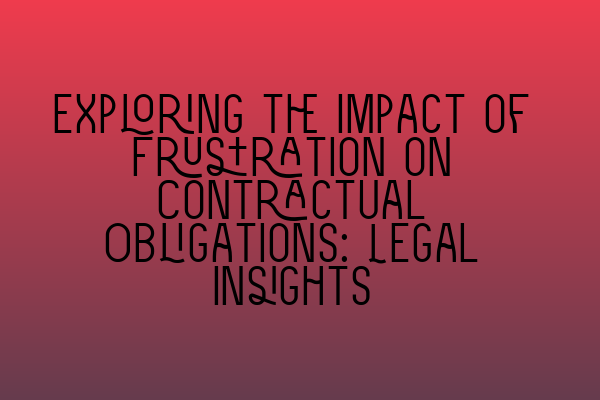Exploring the Impact of Frustration on Contractual Obligations: Legal Insights
Contracts are the lifeblood of business transactions, ensuring that parties involved fulfill their obligations and protect their interests. However, what happens when unforeseen events disrupt the performance of a contract? This is where the legal concept of frustration comes into play.
In this article, we will delve into the impact of frustration on contractual obligations and provide valuable legal insights for businesses and individuals. We’ll explore the definition of frustration, its legal framework, and how it affects contractual obligations. So, buckle up as we uncover the intricacies of frustration in contract law.
Understanding Frustration in Contract Law
Before we dive into the impact of frustration, let’s first define what it means in the context of contract law. Frustration refers to a situation where an event occurs after the formation of a contract, rendering its performance impossible, illegal, or significantly different from what was initially intended.
It is crucial to remember that frustration is not merely a change in circumstances or inconvenience. It must be an event that fundamentally alters the nature of the contract, making it impossible to perform. Examples of events that could potentially lead to frustration include natural disasters, government interventions, or the death or incapacity of a party.
The Legal Framework of Frustration
Now that we have a basic understanding of frustration, let’s explore its legal framework and how it impacts contractual obligations. Frustration is a common law concept, meaning that it is not explicitly defined in legislation but has been developed through judicial decisions.
When a contract is frustrated, it is considered to be automatically terminated, and both parties are relieved from further performance of their obligations. This doctrine aims to prevent injustice by acknowledging that certain circumstances make it unfair to hold parties accountable for something that is beyond their control.
One of the key principles of frustration is that it operates retroactively. This means that it extinguishes any future obligations that parties would have had to perform, but it does not affect any past obligations or liabilities that existed before the frustrating event occurred.
It is important to note that frustration does not automatically release parties from their contractual obligations. Rather, it acts as a defense that can be raised in court to excuse non-performance. The burden of proving frustration rests on the party seeking to rely on it, and the threshold is high.
When determining whether frustration applies, courts will consider various factors, including the nature of the event, the foreseeability of the event, the allocation of risk in the contract, and whether the parties could have reasonably mitigated the effects of the event. Each case is unique, and the court’s decision will depend on the specific circumstances involved.
The Impact of Frustration on Contractual Obligations
Now that we have explored the legal framework of frustration, let’s examine how it impacts contractual obligations. When a contract is frustrated, it ends automatically, and the parties are discharged from their future obligations. However, frustration does not affect any rights or liabilities that have already arisen under the contract.
Furthermore, frustration does not entitle parties to claim damages for breach of contract. Instead, the doctrine of frustration aims to allocate the loss resulting from the frustrating event fairly between the parties. This means that any payments made under the contract before the frustrating event occurred would generally be non-refundable.
It is crucial for parties to carefully review the terms of their contract and consider including specific provisions that address the possibility of frustration. These provisions can outline the rights and obligations of the parties in the event of frustration, such as the allocation of risk or the requirement to provide notice.
By incorporating such clauses, parties can mitigate the uncertainties associated with frustration and ensure that their interests are protected. Interpreting contractual clauses, as discussed in our related article, can help unlock the hidden meanings and provide a comprehensive understanding of the parties’ intentions.
Conclusion
In conclusion, frustration is a significant concept in contract law that has a profound impact on contractual obligations. It allows parties to be released from their future obligations when an unforeseen event renders performance impossible, illegal, or fundamentally different from what was initially intended.
Understanding frustration and its legal implications is crucial for businesses and individuals alike. By being aware of the legal framework surrounding frustration and incorporating suitable provisions in contracts, parties can protect their interests and mitigate the potential risks associated with unforeseen events.
If you’re interested in delving deeper into contract law and other related topics, feel free to check out our related articles:
- Interpreting Contractual Clauses: Unlocking the Hidden Meanings
- Legal Aspects of Business Contracts: Key Considerations for Entrepreneurs
- Agreements in Contract Law: Understanding Its Various Types
- Essentials of Consideration: Understanding the Basis of Contractual Exchange
- Contract Law Tutorials: Simplifying Complex Concepts for Students
Feel free to explore our website for more informative articles and resources on contract law and related topics. If you have any specific queries or require legal assistance, do not hesitate to contact SQE Contract Law. Our team of solicitors is here to provide expert guidance tailored to your needs.
